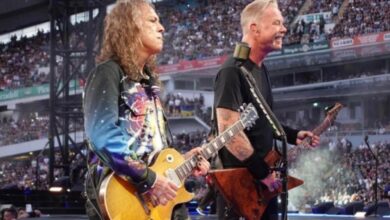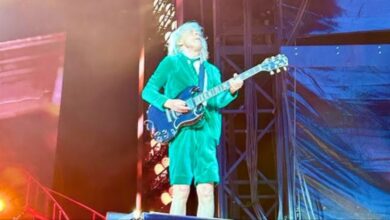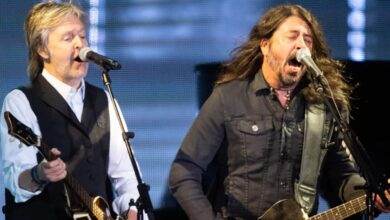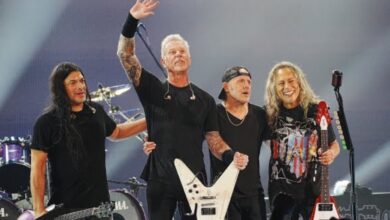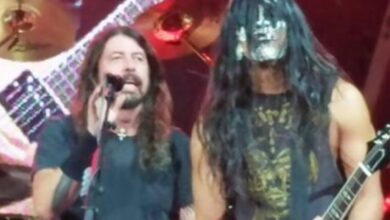Ozzy Osbourne Receives Long-Awaited Solo Induction into the Rock & Roll Hall of Fame, Solidifying His Status as the Prince of Darkness Who Revolutionized Heavy Metal and Inspired Countless Rockers to Embrace Rebellion and Live Fearlessly
After 44 years since the release of his groundbreaking debut album, Ozzy Osbourne has finally received solo recognition with his induction into the Rock & Roll Hall of Fame. Though he was already honored back in 2006 as a member of Black Sabbath, this long-overdue solo accolade highlights his immense influence—not just as part of a legendary band, but as a singular force who shaped the landscape of heavy metal for decades and inspired a legion of followers to unleash their own madness.
The induction ceremony kicked off with a fiery, funny, and heartfelt speech by actor and musician Jack Black. Known for his band Tenacious D and the cult hit *School of Rock*, Black didn’t hold back, calling Ozzy “the greatest frontman in rock and roll history.” He reminisced about being a teenager discovering *Blizzard of Ozz*, crediting it as a life-changing experience, while also saluting Randy Rhoads and the monumental legacy Ozzy helped create alongside Black Sabbath.
Jack Black’s tribute took a comedic turn as he highlighted Ozzy’s cultural impact beyond music, joking that teaming up with his family for *The Osbournes* was possibly “the most evil thing he ever did”—a tongue-in-cheek nod to Ozzy’s accidental role in inventing the reality TV genre. Even in jest, the point was clear: Ozzy’s reach extends far beyond just music. He’s become a global pop culture icon in ways no one could have predicted back in 1980.
As the video montage rolled, the list of artists who paid their respects was a testament to Ozzy’s towering legacy. Music legends and modern icons alike—Rick Rubin, Paul McCartney, Rob Halford, Kirk Hammett, Post Malone, and Zakk Wylde—appeared onscreen to share their admiration. Then, the moment came: Ozzy, perched like a gothic monarch on a throne shaped like a bat, took the stage for what may be one of his last major public appearances.
In the crowd, Ozzy’s grown children, Jack and Kelly, beamed with pride. Kelly, holding her infant son Sidney, made a rare public appearance, while Jack stood beside his daughters, Pearl and Andy. The generational presence of the Osbourne family gave the moment even more emotional weight, as the cameras captured the pride, legacy, and bond of a family built on music, mayhem, and love.
Seated on stage, a visibly frail but sharp-eyed Ozzy, now 75, reflected on the surreal nature of the moment. Battling Parkinson’s disease since 2020, he expressed humble disbelief, saying, “I can’t believe I’m here myself.” His gratitude was palpable as he looked toward his wife Sharon, calling her the one who “saved my life.” Tears welled in her eyes as Jack Black took the mic again and offered a tribute that felt like a battle cry: “Thank you for existing, Ozzy. We love you. You’re a legend.”
Despite his declining health, Ozzy proved he still had a spark left. In a moment that brought the room to its feet, he shouted the iconic “All aboard!” that opens “Crazy Train,” his voice still full of fire and grit. The sound, though tinged with age, rang with the same chaos and fury that defined his career. For fans who grew up on Ozzy’s scream, it felt like witnessing a living relic of rock roar one last time into the void.
What followed was a supergroup performance for the ages. A dream team of musicians—including Chad Smith, Robert Trujillo, Adam Wakeman, Andrew Watt, Billy Idol, Steve Stevens, Zakk Wylde, Jelly Roll, Maynard James Keenan, and Wolfgang Van Halen—assembled to perform a blistering medley of Ozzy’s greatest solo hits. They lit up the stage with “Crazy Train,” “Mama, I’m Coming Home,” and “No More Tears,” igniting the crowd with every note.
Even with this powerhouse lineup, no one could replicate the raw magic of Ozzy’s original vocals. The tribute highlighted just how singular his voice really is—raspy, unhinged, and totally unforgettable. It served as a reminder that while others can play the songs, only Ozzy could have made them legends. His voice, his presence, and his energy remain irreplaceable, carved into the DNA of rock history.
As the final chords echoed through the Hall, the crowd erupted into a standing ovation. Though Ozzy may be physically diminished, his influence has never been stronger. This solo Hall of Fame induction wasn’t just a personal victory—it was a long-overdue celebration of a man whose music, madness, and magnetism helped shape an entire genre. Ozzy didn’t just make heavy metal—he *is* heavy metal.
